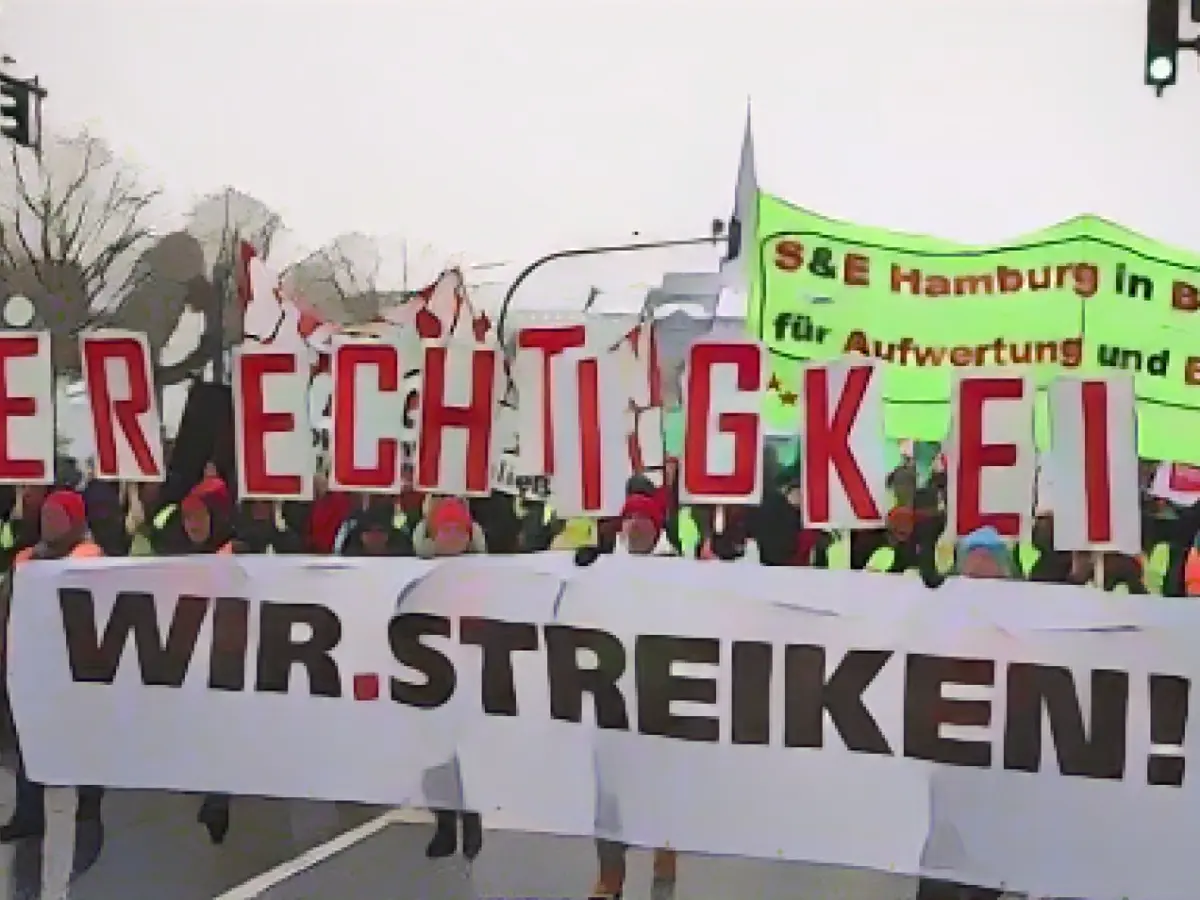Trade unions ramp up pressure on federal states ahead of public sector wage dispute finale
With the potential final round of the wage dispute for the public sector of the federal states looming, trade unions are stepping up the pressure on employers. Verdi boss Frank Werneke has issued a call to action, urging the federal states to present a satisfactory offer. "The hide-and-seek game has to come to an end," Werneke told the German Press Agency in Berlin. "The resolve of state employees to seriously fight for their demands has become strikingly apparent during the ongoing warning strikes," Werneke cautioned. Employers must take notice of the discontent within the workforce, Werneke warned.
Recent weeks have seen employees from various sectors, including university hospitals, universities, and the judiciary, engaging in warning strikes for higher wages. In Düsseldorf alone, around 15,000 employees staged demonstrations in the city center, marching through the streets on a Tuesday. Negotiations between the unions and state employers commence this Thursday in Potsdam.
Additional strikes on the horizon
Ulrich Silberbach, the chair of the dbb civil servants' association, also highlighted the unions' readiness to mobilize and fight in the federal states. "Our colleagues are capable of enforcing strikes in critical areas in the federal states," Silberbach remarked. Implementing such strikes would necessitate a ballot, according to observers. A breakthrough in Potsdam by the weekend appears more likely, or the negotiations may be postponed again, leading to the likelihood of further warning strikes.
Werneke demanded that the state employers in Potsdam put forth an offer that adheres to the TVöD agreement, as per his stipulation. The agreement referred to the one made back in April for the federal and local authorities. As in the current wage dispute, the unions had sought a 10.5% income increase, along with a minimum of 500 euros more. The settlement at the time included tax and duty-free special payments amounting to 3,000 euros, a base income of 200 euros, and a subsequent 5.5% increase. However, the federal states dismissed the union's demands as financially burdensome.
Conflicting messages from the federal states
Werneke pointed out that hundreds of thousands of student employees must now be included under collective agreements. Overall, the federal states carry a responsibility to provide citizens with adequate public services and ensure that their employees are fairly compensated.
In recent days, the federal states have conveyed mixed messages to the trade unions, as Silberbach acknowledged. The state finance ministers are now realizing that they must maintain parity with the federal and local governments when it comes to salary, Silberbach asserted. At the same time, they are looking to the employees to contribute to the budget restructuring of the federal states. Nevertheless, the trade unions will not accept real wage declines.
Additional Insights
The ongoing wage dispute in the German public sector involves various sectors and unions, as follows:
- Public Transport Strike: Verdi has called for a series of warning strikes at Berlin's urban transit operator BVG, which includes bus, tram, and subway services.
- Deutsche Post Strike: Verdi is planning further strikes at Deutsche Post, the owner of DHL, due to the company's proposals for job and wage cuts.
- Bosch Dispute: IG Metall, the trade union involved in this dispute, is criticized for its role in supporting the company's cost-cutting measures.
The outcome of these wage disputes hangs in the balance, influenced by various factors, including the election campaign, government policies, and worker solidarity. It remains to be seen whether unions can achieve their demands for fair wages and working conditions in the face of economic and political challenges.
Relevant Enrichment Data
The current wage dispute between the federal states and trade unions in Germany is a complex issue, impacting multiple sectors and unions. Here are some insights based on recent developments:
- Public Transit Dispute: Verdi has organized fragmented strikes at Berlin's urban transit operator BVG, aiming to avoid a broader strike movement. The latest strike on February 13 caused disruptions to S-Bahn services, while further strikes are planned for March 21, as per a 40-day ultimatum.
- Deutsche Post Dispute: Deutsche Post has offered a 3.8% payment increase and an additional vacation day in the third round of negotiations, but Verdi has called for further strikes. The exact date for the fourth round of negotiations has yet to be established, with plans for future strikes underway.
- Bosch Dispute: Bosch, a significant automotive supplier, is cutting jobs and wages while aiming to double its profits by 2026, sparking outrage from IG Metall, the trade union involved. Despite public criticism, IG Metall has delayed a nationwide day of protest until after the federal election, fearing disruptions to the election process.
Further developments in these wage disputes will depend on a range of factors, including the election landscape, government policies, and worker solidarity. The unions will need to find a balance between achieving their demands and navigating the broader economic and political context in Germany.








